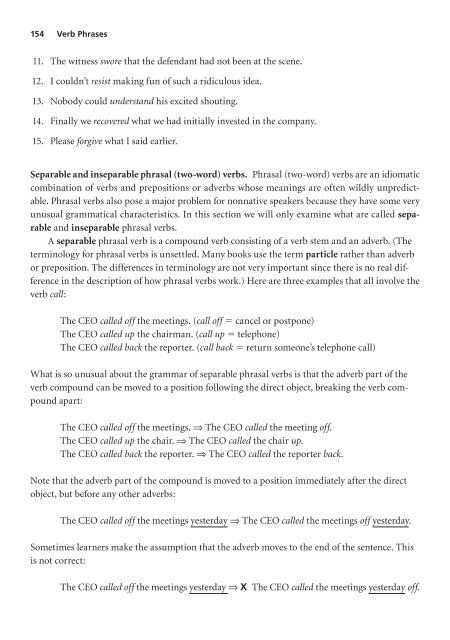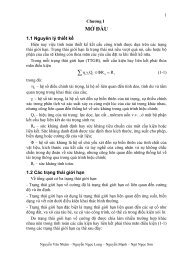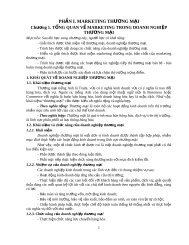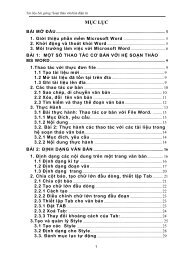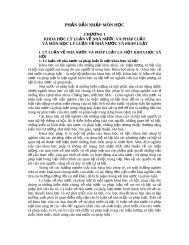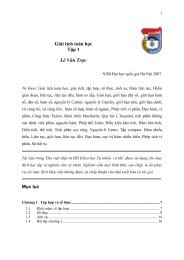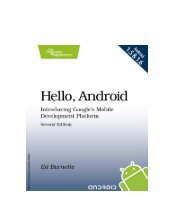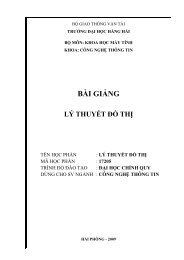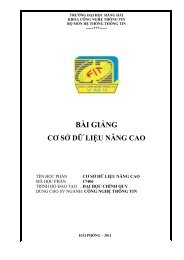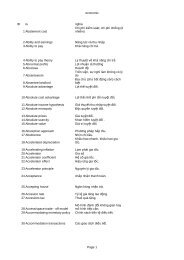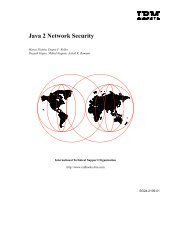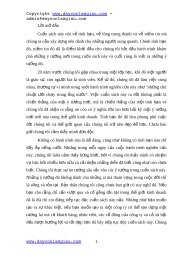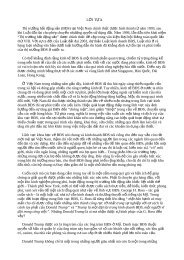- Page 2 and 3:
ENGLISH GRAMMAR DRILLS
- Page 4 and 5:
ENGLISH GRAMMAR DRILLS Mark Lester
- Page 6 and 7:
Contents Preface . . . . . . . . .
- Page 8 and 9:
Preface This book focuses on the gr
- Page 10 and 11:
PART 1 Noun Phrases
- Page 12 and 13:
1 Nouns Proper and common nouns The
- Page 14 and 15:
Count nouns Nouns 5 Most count noun
- Page 16 and 17:
Nouns 7 Singular fly toy Plural fli
- Page 18 and 19:
Nouns 9 on the pronunciation of the
- Page 20 and 21:
Nouns 11 thief wolf thieves wolves
- Page 22 and 23:
Nouns 13 cheese (noncount): cheese
- Page 24 and 25:
Nouns 15 that the -s’ with these
- Page 26 and 27:
Nouns 17 Exercise 1.7 Write the plu
- Page 28 and 29:
Adjectives 19 1. It always immediat
- Page 30 and 31:
Adjectives 21 3. fast/all fast: all
- Page 32 and 33:
Adjectives 23 -Y Base Comparative S
- Page 34 and 35:
Adjectives 25 13. physical 14. stra
- Page 36 and 37:
3 Articles Articles are by far the
- Page 38 and 39:
Articles 29 The use of the definite
- Page 40 and 41:
Articles 31 In the first example, w
- Page 42 and 43:
Articles 33 This is the first time
- Page 44 and 45:
Articles 35 4. Go down Elm Street a
- Page 46 and 47:
Articles 37 1. When the speaker doe
- Page 48 and 49:
Articles 39 Exercise 3.6 Fill in th
- Page 50 and 51:
Articles 41 Dogs are usually protec
- Page 52 and 53:
Articles 43 4. Can you get bread an
- Page 54 and 55:
Post-Noun Modifiers 45 The tall you
- Page 56 and 57:
Post-Noun Modifiers 47 beyond betwe
- Page 58 and 59:
Post-Noun Modifiers 49 As you can s
- Page 60 and 61:
Post-Noun Modifiers 51 We interview
- Page 62 and 63:
Post-Noun Modifiers 53 In this sent
- Page 64 and 65:
Post-Noun Modifiers 55 In the follo
- Page 66 and 67:
Post-Noun Modifiers 57 13. The key
- Page 68 and 69:
Post-Noun Modifiers 59 12. They ide
- Page 70 and 71:
Post-Noun Modifiers 61 1. The Shake
- Page 72 and 73:
Post-Noun Modifiers 63 1. By far th
- Page 74 and 75:
Post-Noun Modifiers 65 Since we typ
- Page 76 and 77:
5 Pronouns In this chapter we will
- Page 78 and 79:
Pronouns 69 Object Him: Her: It: Th
- Page 80 and 81:
Pronouns 71 Subject: Object: Comple
- Page 82 and 83:
Pronouns 73 Of the two solutions, t
- Page 84 and 85:
Reflexive pronouns Pronouns 75 Refl
- Page 86 and 87:
Pronouns 77 4. I told them that I w
- Page 88 and 89:
Pronouns 79 4. I couldn’t help sm
- Page 90 and 91:
Gerunds and Infinitives 81 Exercise
- Page 92 and 93:
Gerunds and Infinitives 83 it Don
- Page 94 and 95:
Gerunds and Infinitives 85 Gerund:
- Page 96 and 97:
Gerunds and Infinitives 87 Infiniti
- Page 98 and 99:
Gerunds and Infinitives 89 13. The
- Page 100 and 101:
7 Noun Clauses Noun clauses are dep
- Page 102 and 103:
Noun Clauses 93 Predicate nominativ
- Page 104 and 105:
Noun Clauses 95 1. That it was over
- Page 106 and 107:
Noun Clauses 97 3. The experiment t
- Page 108 and 109:
Wh- clauses Noun Clauses 99 The sec
- Page 110 and 111:
Noun Clauses 101 it The question is
- Page 112 and 113: Noun Clauses 103 When we hear or re
- Page 114 and 115: Noun Clauses 105 9. My friends were
- Page 116 and 117: Noun Clauses 107 5. They were natur
- Page 118 and 119: PART 2 Verb Phrases
- Page 120 and 121: 8 Basic Verb Forms This chapter dea
- Page 122 and 123: Basic Verb Forms 113 We can show th
- Page 124 and 125: Present tense Basic Verb Forms 115
- Page 126 and 127: Basic Verb Forms 117 The third-pers
- Page 128 and 129: Basic Verb Forms 119 16. show 17. f
- Page 130 and 131: Basic Verb Forms 121 12. approach 1
- Page 132 and 133: Basic Verb Forms 123 Base hop rob r
- Page 134 and 135: Present participle Basic Verb Forms
- Page 136 and 137: Basic Verb Forms 127 fly freeze hid
- Page 138 and 139: 9 Verb Tenses This chapter deals wi
- Page 140 and 141: Verb Tenses 131 Been is a helping v
- Page 142 and 143: Verb Tenses 133 The present tense i
- Page 144 and 145: Verb Tenses 135 The use of the past
- Page 146 and 147: Verb Tenses 137 past tense present
- Page 148 and 149: Verb Tenses 139 The audience took t
- Page 150 and 151: Verb Tenses 141 The train leave the
- Page 152 and 153: Verb Tenses 143 The practical diffe
- Page 154 and 155: Verb Tenses 145 12. The design cons
- Page 156 and 157: Future progressive Verb Tenses 147
- Page 158 and 159: Simple Verb Complements 149 In this
- Page 160 and 161: Simple Verb Complements 151 The old
- Page 164 and 165: Simple Verb Complements 155 Even mo
- Page 166 and 167: Simple Verb Complements 157 The obv
- Page 168 and 169: Simple Verb Complements 159 14. We
- Page 170 and 171: Simple Verb Complements 161 3. The
- Page 172 and 173: Simple Verb Complements 163 14. Our
- Page 174 and 175: Simple Verb Complements 165 1. The
- Page 176 and 177: 11 Multiple Verb Complements A comp
- Page 178 and 179: Multiple Verb Complements 169 6. Pa
- Page 180 and 181: Multiple Verb Complements 171 1. My
- Page 182 and 183: Multiple Verb Complements 173 In bo
- Page 184 and 185: Multiple Verb Complements 175 8. Th
- Page 186 and 187: Multiple Verb Complements 177 He dr
- Page 188 and 189: Multiple Verb Complements 179 8. Th
- Page 190 and 191: Multiple Verb Complements 181 That
- Page 192 and 193: Multiple Verb Complements 183 Even
- Page 194 and 195: Multiple Verb Complements 185 causa
- Page 196 and 197: Multiple Verb Complements 187 Exerc
- Page 198 and 199: Multiple Verb Complements 189 Objec
- Page 200 and 201: Multiple Verb Complements 191 14. I
- Page 202 and 203: Adverbs 193 3. now 4. also 5. even
- Page 204 and 205: Adverbs 195 honest jealous last qui
- Page 206 and 207: Adverbs 197 Adjectives due gay true
- Page 208 and 209: Adverbs 199 completely The plan was
- Page 210 and 211: Adverbs 201 Exercise 12.5 Underline
- Page 212 and 213:
Adverbs 203 Sub Conj statement I’
- Page 214 and 215:
Adverbs 205 Adverb infinitive phras
- Page 216 and 217:
Adverbs 207 Adverbs of place (singl
- Page 218 and 219:
Order of adverbs Adverbs 209 There
- Page 220 and 221:
Adverbs 211 14. to get any real com
- Page 222 and 223:
PART 3 Sentences
- Page 224 and 225:
13 Questions and Negatives Every la
- Page 226 and 227:
Questions and Negatives 217 The bas
- Page 228 and 229:
Questions and Negatives 219 2. You
- Page 230 and 231:
Questions and Negatives 221 Here ar
- Page 232 and 233:
Questions and Negatives 223 3. That
- Page 234 and 235:
Questions and Negatives 225 8. The
- Page 236 and 237:
Questions and Negatives 227 Noun ph
- Page 238 and 239:
Questions and Negatives 229 Here ar
- Page 240 and 241:
Questions and Negatives 231 11. He
- Page 242 and 243:
Questions and Negatives 233 3. The
- Page 244 and 245:
Questions and Negatives 235 5. Why
- Page 246 and 247:
Questions and Negatives 237 Here is
- Page 248 and 249:
Questions and Negatives 239 7. I am
- Page 250 and 251:
Questions and Negatives 241 Exercis
- Page 252 and 253:
Questions and Negatives 243 changes
- Page 254 and 255:
Questions and Negatives 245 Often a
- Page 256 and 257:
Questions and Negatives 247 Exercis
- Page 258 and 259:
14 The Passive In most sentences, t
- Page 260 and 261:
The Passive 251 3. Finally, the mys
- Page 262 and 263:
The Passive 253 McGraw-Hill publish
- Page 264 and 265:
The Passive 255 Active: Passive: Mo
- Page 266 and 267:
The Passive 257 10. They are talkin
- Page 268 and 269:
15 Indirect Quotation There are two
- Page 270 and 271:
Indirect Quotation 261 Present prog
- Page 272 and 273:
Indirect Quotation 263 3. Rudy said
- Page 274 and 275:
Indirect Quotation 265 In many lang
- Page 276 and 277:
Indirect Quotation 267 4. They aske
- Page 278 and 279:
Indirect Quotation 269 Exercise 15.
- Page 280 and 281:
Final Review 271 Exercise 16.2 (Cha
- Page 282 and 283:
Final Review 273 4. Be careful, the
- Page 284 and 285:
Final Review 275 Exercise 16.9 (Cha
- Page 286 and 287:
Final Review 277 5. The students co
- Page 288 and 289:
Final Review 279 Exercise 16.16 (Ch
- Page 290 and 291:
Final Review 281 9. I certainly sym
- Page 292 and 293:
Final Review 283 4. reply 5. ship 6
- Page 294 and 295:
Final Review 285 6. We go for a swi
- Page 296 and 297:
Final Review 287 8. She dressed up
- Page 298 and 299:
Final Review 289 2. What book have
- Page 300 and 301:
Final Review 291 8. After the prese
- Page 302 and 303:
Final Review 293 Exercise 16.34 (Ch
- Page 304 and 305:
Answer Key Chapter 1 Exercise 1.1 1
- Page 306 and 307:
Answer Key 297 Exercise 2.3 1. capa
- Page 308 and 309:
Answer Key 299 Chapter 4 Exercise 4
- Page 310 and 311:
Answer Key 301 4. that you can wear
- Page 312 and 313:
Answer Key 303 Exercise 6.2 1. Putt
- Page 314 and 315:
Answer Key 305 using his hands. 4.
- Page 316 and 317:
Answer Key 307 Chapter 9 Exercise 9
- Page 318 and 319:
Answer Key 309 Exercise 10.4 1. Ins
- Page 320 and 321:
Answer Key 311 of State for Latin A
- Page 322 and 323:
Answer Key 313 Exercise 11.13 1. Ob
- Page 324 and 325:
Answer Key 315 last ice storm, the
- Page 326 and 327:
Answer Key 317 Exercise 13.6 1. ∅
- Page 328 and 329:
Answer Key 319 Chapter 14 Exercise
- Page 330 and 331:
Answer Key 321 of her car yet. 9. A
- Page 332 and 333:
Answer Key 323 Exercise 16.12 1. my
- Page 334 and 335:
Answer Key 325 Exercise 16.25 1. vi


